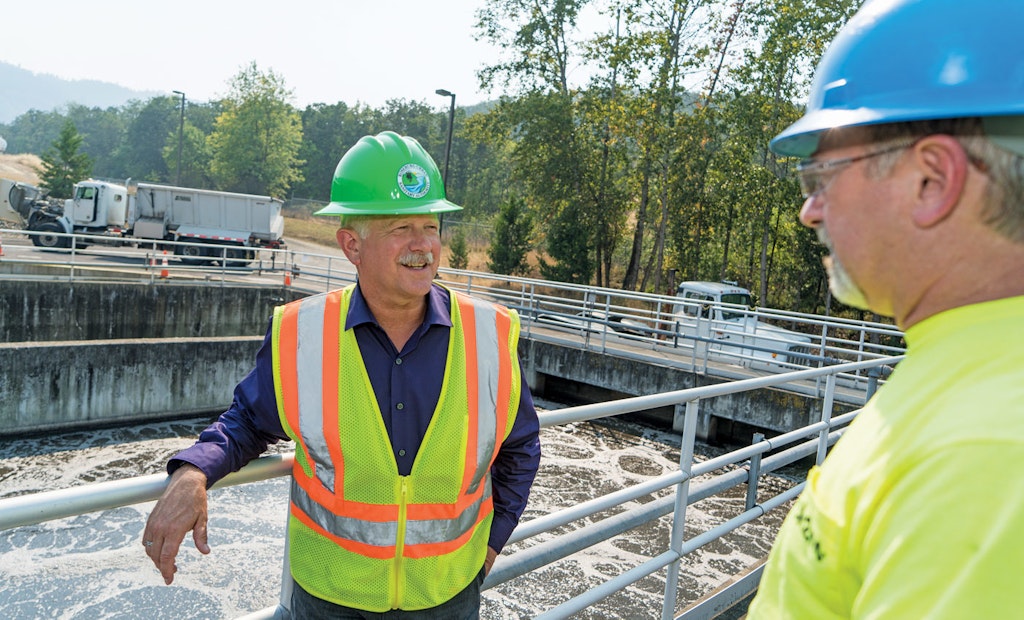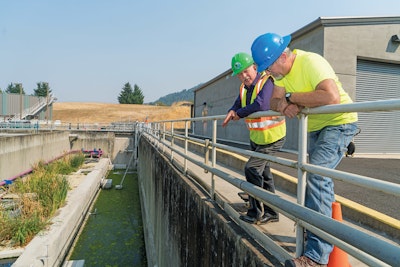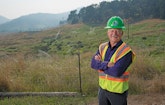
Jim Baird and Kevin Bruton discuss procedures at the treatment facility. Baird’s other job — his volunteer work — is making sure water and wastewater operators get the training and education they need to be successful.
Jim Baird has a passion for operator education.
As engineering and operations manager for the Roseburg (Oregon) Urban Sanitary Authority, he manages the engineering and collections teams in all aspects of operation, maintenance and construction. He also oversees the authority’s $1.4 million annual contract with CH2M to operate the wastewater treatment plant.
His other job — the volunteer work that gets him animated — is making sure water and wastewater operators get the training and education they need to be successful. “As vice president of Pacific Northwest Clean Water Association, I spent the past year going to as many short schools and operator conferences as I could,” Baird says. “When I meet with those operators, there’s a lot of gray hair.
“With every talk I give, I thank them for being the professionals they are and for their years of dedication to our industry. I say, ‘Look around. Kind of scary, isn’t it? A lot of you are going to retire one day soon and head to your rocking chair.’ We have to figure out a way, as an industry, for the youth in our communities to see this as a profession, a value, as something they could do for their entire life and feel wonderful about.”
A winding road
Baird’s path to his current position is similar to that of many water professionals. He began work life as a ranch hand but wasn’t making much money and moved on to timber. “The entry-level job is on what they call a reforestation crew,” he says. “I signed up with that group and planted trees all fall and spring.
“When we were done, the folks who wanted to stay on were offered other positions. I was offered one working with their surveyor, laying out roads. I really enjoyed it. The surveyor was a very giving guy and shared a lot. We worked most of the summer doing that, and then we ran out of work, so I started with a crew logging the roads we’d just laid out.”
Logging meant getting up at 3 a.m. and getting to the crew transportation van by 4 a.m. They’d drive to the job site and work eight hours, then head back down home by 5 p.m.
When the crew was laid off for the winter, Baird decided to do something different. Umpqua Community College offered a two-year associate of science degree in civil engineering technology, and Baird signed up.
He went to school and had surveying jobs during summers. When he finished school, he took a job in Public Works with the city of Roseburg, handling road projects as an engineering technician. From there, he was shifted into the water sector. While working for the city, he took a volunteer position in 1994 with the Roberts Creek Water District. That job, which lasted 15 years, became his water management learning laboratory.
Getting dirty
He spent 10 years with Roseburg and then went into private practice as a technician with an engineering company, laying out and working on projects. That lasted about 18 months, after which he joined a startup company, Romtec Utilities, that was designing and installing sewage lift stations.
“That was my introduction to dirty water,” Baird says. “Up until then, I’d been with clean water and roads. I was the only employee in the beginning. I learned a lot about the wastewater sector and about pumping and all the challenges. I developed six patents on the equipment we designed, and I worked with two or three engineering firms to bring the idea to market. Then I sold it all over the U.S. for 10 years.”
As technical sales manager and senior applications engineer, he also designed and delivered courses to teach engineers what his company did and the advantages of purpose-built lift stations. He had installed more than 200 lift stations by the time he left Romtec Utilities after 10 years, weary of being on the road and away from his family for weeks at a time.
Working with the pros
In 2009, he signed on for his current job with the Roseburg Urban Sanitary Authority. “It’s a good job, and it means being away from home only about four times a year, rather than every other week,” he says.
“When I went to work for the Roseburg Urban Sanitary Authority, one requirement was that I become a certified collections system operator. So, I got involved with our local Pacific Northwest Clean Water Association section, the Umpqua Basin Operators Section.” He attended the Umpqua Basin Operators Section short school and began accumulating continuing education credits so he could take the Grade 3 (second highest) collections exam, which he passed.
“I refer to my people here as professionals,” Baird says. “I do that because No. 1, they are, and No. 2, we require our people to do more with the same number of people on staff. Increasing staff is hard to get past your board and your ratepayers. The question is always: ‘Why do you need another person? We haven’t grown that much.’”
Baird believes water utilities must depend upon tools — software and equipment — to make themselves more productive. “We give the operators very little training. We give them the book and say, ‘Go make it work.’ And they do.”
Helping operators
Wearing his Pacific Northwest Clean Water Association vice president hat, Baird says the best way to help operators help their employers is to provide training: “We want to do everything we can to have the best professionals working for us. We know that means we have to pay for training. We also know that training may make our employees more attractive in the marketplace, so they can move on to better jobs. But we benefit from their training and certifications while they’re here.”
Baird notes that some municipalities, especially smaller ones, have a tough time paying for training. So he has worked for the past several years to make CEU training for operators more meaningful. Working with the Oregon Section of Pacific Northwest Clean Water Association, Baird changed the annual short school training in his local Umpqua Basin Operators Section to the Oregon Operators Conference.
He brought in vendors to show the operators new technologies and generally enhance the experience. Vendors’ fees for booth space helped keep the training affordable to operators from communities of all sizes. Baird worked with Umpqua Basin Operators Section to develop specific exam-related training through a partnership with Umpqua Community College. With other operators, he looked at the exam failure rates: “They were pretty dismal. So, we started a class with the Umpqua Community College during spring break, when the college has a lot of classrooms open. It was designed to go over the types of exam questions and the information operators needed to know to take each of the certification exams.”
Separate courses are offered for operators preparing for grades 1-2 and grades 3-4 collection and treatment certification exams.
One day is devoted to math, taught by an engineer from Klamath Falls. Average attendance has increased from 28 the first year to 65 now, and exam pass rates have turned around. The Umpqua Basin Operators Section has generated enough money through the improved conferences to make $5,000 donations to the Pacific Northwest Clean Water Association for the past two years. The money funds an operator scholarship and a brand-new scholarship in the name of Lucas Eibel, who worked with Roseburg Urban Sanitary Authority as an intern.
“Lucas was just a stellar human being, a kid you knew would make some great contributions to this world,” Baird says. He was one of the victims of a shooting at Umpqua Community College in 2015. Umpqua Basin Operators Section members worked with the Pacific Northwest Clean Water Association to start the scholarship in his memory.
“It’s essential that we do everything we can within the limits of technology and finance to be as good at our jobs as possible,” Baird says. “The only way we’re going to do that is to make sure the operators and midlevel managers get all the training they can.”
The strength of family
It doesn’t take long when talking to Jim Baird to discover he’s a family man. When he decided to attend Umpqua Community College, he was already married. He and his wife, Nancy, figured out a budget so he could attend school full-time.
As his first-year finals approached, he asked the professor for one course how he was doing. The professor said he had a strong A. Baird asked what he would get if he skipped the final. The answer: B.
So Baird went home to bed after being up all night while Nancy delivered their twin boys. Seven years later, daughter No. 1 came; she’s just graduating from college. Seven years after that came daughter No. 2, now a sophomore in high school.
“I can’t go without saying I have probably the most wonderful wife in the world,” Baird says. “Through all this stuff — through her working up until it was almost time for the boys to be born, to figuring out how to live on a really reduced budget while she worked part-time so I could go to school, to putting up with 15 years of me being gone two or three nights a week while I worked with Roberts Creek and Romtec Utilities — she was home with four kids.
“I got on a plane every other Sunday or Monday and wasn’t home until Friday. I couldn’t be where I am without Nancy.”







